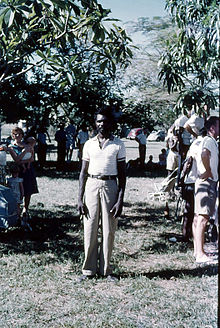BLACK SOCIAL HISTORY
Robert Tudawali
| Robert Tudawali | |
|---|---|

Tudawali at the Bagot Native Settlement in 1960
| |
| Born | Robert Tudawali 1929 Melville Island, Northern Territory |
| Died | July 1967 (aged 37–38) Darwin, Northern Territory |
Cause of death
| Severe burns and tuberculosis[1] |
Resting place
| Darwin cemetery |
Robert Tudawali (1929–1967) was an Australian actor, born and raised on Melville Island in the Northern Territory.[1] He became the first Aboriginal film star as a result of playing the lead role, Marbuck, in Jedda.
A leading Australian rules footballer as a youth, he alternated several times between Aboriginal and white society. Tudawali used the name Bobby Wilson in Darwin. Under this name he took part in the TV series Whiplash.
Tudawali also served as Vice-President of the Northern Territory Council for Aboriginal Rights, and, working with trade unionists and author Frank Hardy, fought to highlight the poor wages and conditions of Aboriginal stockmen in the Northern Territory, which culminated in the Wave Hill walk off in 1966.[2] Tudawali had organised to give a series of talks to unionists throughout Australia in support of the stockmen when the Northern Territory administration banned any travel by Tudawali due to the tuberculosis he was suffering at the time.[2]
Tudawali died of severe burns on 26 July 1967 following an incident on Bagot community, Darwin.[1]
Tudawali
| Tudawali | |
|---|---|
| Directed by | Steve Jodrell |
| Produced by | Paul Barron Julia Overton |
| Written by | Alan Seymour David Rapsey |
| Starring | Ernie Dingo Peter Fisher Frank Wilson Charles Tingwell Suzanne Peveril Bill McCluskey Michelle Torres |
| Cinematography | Michael Edols |
Production
company |
SBS-Barron Films
|
| Distributed by | SBS |
Release dates
| 28 January 1988 |
| Country | Australia |
| Language | English |
| Budget | $750,000.[3] |
Tudawali was released on DVD by Umbrella Entertainment in July 2010. The DVD is compatible with all region codes and includes special features such as a stills gallery, press clippings, a featurette entitled Walkabout and Oondamooroo: Profile of Ernie Dingo.[6]



































































































No comments:
Post a Comment